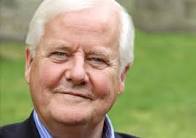Fake news is the inevitable fruit of several generations of naturalism and evolutionism.
Ideas take time to move from conception to fruition. In 1882, German philosopher Friedrich Nietzsche insinuated that “God is dead.” Over the generations since, we have seen the gradual death of everything based on God’s existence, including objective truth, goodness and beauty.
God was dismissed by the modern, post-Christian world. Some Christians and Jews continue to consciously affirm the truth of God’s existence and the reality of the world He created. But many others simply live off the memory of this framework. Most in the modern world have rejected the Judeo-Christian mind and have consciously or unconsciously embraced the modern, naturalistic mind.
Modern man (as opposed to postmodern) has maintained a naturalistic metanarrative. He regards as true only what is “scientific.” That is, only those things that can be examined by the senses are true. That entails losing at least half of the universe, that which is unseen: love, intuition, creativity, truth, goodness and beauty.
The postmodern or Neo-Pagan world, on the other hand, has abandoned the concept of metanarrative altogether. There is no unified field of knowledge. Truth is now small truth, it is my truth. The world, and its “factness,” disappears. The world is smaller; it is simply what I imagine it to be. All “truth” is a social construct. The reality of biology is being replaced with the gender a person “identifies with.” As we have written here, truth has been replaced by “narrative.”
Watch the video to see Seattle University students manifest the postmodern concept of truth as a social construct.
We have written about this phenomenon in the world of politics here.
In the last few months, two phrases that reflect postmodern influence have captured broad attention: post-truth and fake news.
Casper Grathwohl, president of Oxford Dictionaries (OD), said post-truth—the OD 2016 international word of the year—could become “one of the defining words of our time.” Post-truth is defined as “an adjective relating to circumstances in which objective facts are less influential in shaping public opinion than emotional appeals.” Evidently the word was first used in 1992. But it was invoked too infrequently to gain attention until 2016, when its usage increased over the previous year by 2000 percent!
Grathwohl said, “Fueled by the rise of social media as a news source and a growing distrust of facts offered up by the establishment, post-truth as a concept has been finding its linguistic footing for some time.” Go here to read more.
Not to be outdone, the Australian Macquarie Dictionary identified their 2016 Word of the Year as “fake news … disinformation and hoaxes published on websites for political purposes or to drive web traffic” and “the incorrect information being passed along by social media.”
This definition stops short of the larger reality by limiting fake news to social media and internet sources. As more and more people are recognizing, mainstream media outlets often act as propaganda machines for statists, establishment elites in many European capitals and Washington DC. I think of European governments that muzzle the press from reporting honestly the violence and rapes perpetrated by Muslim immigrant populations. We have written about that here. The USA press is 90 percent statist, supporting progressive causes and promoting—and voting for—Hillary Clinton.
A better definition of fake news is the reporting, by both “professional” and non-formal news sources, that does not correspond with objective truth. For more on “fake news” read ‘Fake news’ named word of the year by Macquarie Dictionary.
Both post-truth and fake news rest on the assumption that objective truth no longer exists. Truth is made up as we go along, it is socially constructed.
But while post-truth and fake news share a foundation, they have dissimilarities as well. Post-truth is more benign, reflecting the general milieu of the culture. People may say whatever they want whether it has any connection to reality or not. We witnessed this in the video above.
Fake news is more insidious. It is the spin room, where “truth” is manufactured to manipulate the public. It is better called a “lie” or propaganda. It is conscious lying to lead people, as one would lead sheep, to support the social concerns and political causes of the ruling elites.
The Judeo-Christian worldview creates a framework for objective truth, Truth with a capital “T.” Certain assumptions are foundational to the concept of objective Truth:
- God exists.
- He has made a real and orderly universe.
- He has revealed himself through his works – creation, and His word – the Bible.
- Man has been made in the image of God and can explore the universe to come to understand its nature, structure and laws.
Based on these assumptions, human beings are called to a grand adventure, to explore the creation to find truth and live within the framework of reality as God has made it.
This adventure requires the virtues of an inquisitive mind, personal and corporate integrity, honesty, sometimes courage, and willingness to follow the evidence. It requires critical thinking, i.e. thinking outside the box, challenging everything that does not correspond with reality. As the Apostle Paul puts it in Romans 12:2, “Do not be conformed to this world, but be transformed by the renewal of your mind, that by testing you may discern what is the will of God, what is good and acceptable and perfect.”
People in search of truth must be willing to think. Jesus says as much in John 8:31-32: 31, “To the Jews who had believed him, Jesus said, ‘If you hold to my teaching, you are really my disciples. Then you will know the truth, and the truth will set you free.’”
We are to pursue truth and it is truth that sets us free.
Two approaches to truth are featured in Acts 17. First, when Paul “reasoned with” the Thessalonians, some believed, but some reacted emotionally and started a mob action. When Paul taught in Berea, the people “received the message with great eagerness and examined the Scriptures every day to see if what Paul said was true.” What were the Bereans interested in? They wanted to know the truth! This was the virtue that separated them from the Thessalonians.
 Os Guinness, in his latest book, Impossible People: Christian Courage and the Struggle for the Soul of Civilization, sees the modern world as moving so fast we rarely take time for the reflection necessary to discover truth.
Os Guinness, in his latest book, Impossible People: Christian Courage and the Struggle for the Soul of Civilization, sees the modern world as moving so fast we rarely take time for the reflection necessary to discover truth.
So who then has time to think? To think for ourselves rather than taking the Internet consensus as fast food for the mind? To think sufficiently in the light of biblical wisdom to be able to be discerning? To have the space for worship, for solitude, for the spiritual disciplines, and the space to live as a counterculture to the craziness of this pressure-cooker life? It may well be that the advanced modern world requires more careful discernment than any previous age faced by Christians in history. But it is beyond question that the advanced modern world allows us less time to think about life and or own lives and offers us fewer tools to wrestle with its deepest challenges.
Now more than ever, as the winds of post-truth and fake news swirl around us, we must make time to ask, “Is it true?” We should abandon the false standards of pragmatism – “Does it work?” and subjectivism – “does it feel good?” The designation of post-truth and fake news as 2016 words of the year comprises a wakeup call to the church. Let’s don’t be Thessalonians but Bereans. Let’s be those who seek the truth again! Let’s recreate the truth culture our Christian forefathers did.
- Darrow Miller







4 Comments
Megan
February 28, 2017 - 6:03 amExcellent reminder, thank you. I couldn’t seem to find the link to the Seattle Pacific University video. Where can I find it?
Thanks again, I appreciate all you do.
Megan Burmester
YWAM LA
admin
February 28, 2017 - 8:51 amHi, Megan,
I’m sorry, the emailed version of the blog cannot reproduce the video. Please go to the web version to see the video. It’s worth an extra click!
Thank you for your encouragement.
Gary Brumbelow
Romina Aliaga
February 28, 2017 - 8:03 pmGracias!! Me anima a seguir separando tiempo, para buscar de Dios y su Palabra. A no congormarme, a inquirir y ser critica.
admin
March 1, 2017 - 5:55 amThank you, Romina.
Gary Brumbelow